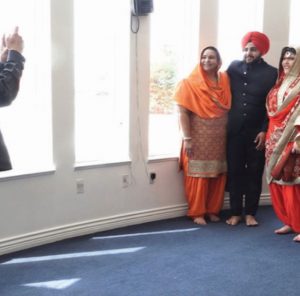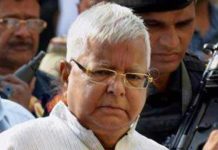 If you were under the impression that the RSS and the other connected Right-Wing outfits are making steady intrusions only within the confines of our country then be prepared for a shocker of sorts; though let me be quick to add that nothing really shocks in these fascist- ridden times! After all, every single day news reports are laced with violence and counter-violence erupting because the onslaughts are getting far too complicated and complex; what, with Hindutva brigades controlling lives and livelihoods.
If you were under the impression that the RSS and the other connected Right-Wing outfits are making steady intrusions only within the confines of our country then be prepared for a shocker of sorts; though let me be quick to add that nothing really shocks in these fascist- ridden times! After all, every single day news reports are laced with violence and counter-violence erupting because the onslaughts are getting far too complicated and complex; what, with Hindutva brigades controlling lives and livelihoods.
And in this context, no great news coming from the United States of America. In the recent years there have been more than indications that a large number of Indians settled out there, are turning Right-Wing. Yes, blatant about their biases and approach.
One can’t forget the tweets of the America based academic, Rajiv Malhotra. Imagine, amid the Kerala floods soliciting donations “for Hindus”. “Christians and Muslims worldwide raising lots of money to help mainly their own ppl & agendas”.
Not to overlook the fact that each time the America based businessman, Shalabh Kumar, who set up the Republican Hindu Coalition in America, came on the small screen he did not bother to add the vital ‘Indian’ prefix to his name. In fact, all his utterances gave the impression that only ‘Hindus’ live in Hindustan. With that, he was misguiding-cum-misleading not just the West but even the people of this subcontinent. He was quite obviously trampling upon the basic fact of our co- existence, as don’t Sikhs, Parsis, Muslims, Dalits, Christians, Atheists also live in Hindustan but he couldn’t give a damn. After all, he proclaimed to be close to Narendra Modi and also to Donald Trump! Trumpeting his connections with the Right- Wing, he seemed to be getting away with all his utterances!
♦ ♦ ♦
One didn’t quite realise the extent and depth of the Right-Wing penetration amongst the Indian community, till one viewed this latest documentary film of Ajay Raina. Titled — DiasPura, it is shot in the United States of America, where this well-known, award-winning film maker takes the viewer through an entire array of shots and with that a full range of commentators.
And together with the immediate focus, Raina also raises several pertinent questions — “In thinking of the Indian diaspora, other questions that come to the fore include the race relations between Indians, blacks and whites, the question of ‘otherness’: ‘of Indians in relation to ‘Americans’, and of certain Indians in relation to other Indians, as they replicate the age-old ethnic / regional and religious relationships and caste hierarchies with each other in the new land.”
It’s a rather offbeat film, which introduces to the viewer the prevailing psyche of many an Indian settled in the Trump –land! And it’s from there that he or she is trying to justify Hindutva, either rather too emphatically or else through those subtle relays. In fact, after I viewed this film last evening, I have been sitting in a rather introspective mood, wondering where we heading! What, with divisiveness overtaking sense and sensitivities.
Yes, this film could be termed an eye –opener to the changing political patterns and the long term affects that they could drag along. The aftermath could be unpleasant as hardened views stand out, loud and clear.
I had to ask Raina, the backgrounders or that crucial ‘why’ he decided to go ahead and show us this reality. Its best to quote Raina on the very making of this film — “Taking off from Prime Minister, Narendra Modi’s spectacular address to Indian — American community at Madison Square Garden in 2014, ‘DiasPura’, is an observational study of the subculture of a wide cross section of the Indian — immigrant community in the USA. It explores the process of identity formation of Indian settlers in America while focusing on the critical relationship of their politics to the reality of regressive, majoritarian and identity based politics of Hindu Rightist movement back home. This politics manifests in the form of the desire of many Indian-American communities to build fortresses of ‘little Indias’ in many parts of USA, where they can express their relationship with Mother country through reimagining of a pristine Hindu cultural heritage and an intense involvement, even interference in its political life.”
In fact, Raina also details the significant backgrounders — “Though there is nothing surprising about the interest that South Asian Americans have always shown in politics back home, at the same time it raises many issues and questions about the nature and quality of their engagement with the mother country. If at first, the founding of GHADAR Revolutionary Party in 1913 at California was in response to the British colonialism of India, in the present times, the political focus of some of the expatriate Indians has shifted from ‘Pan Indian-ism’ to more regional, parochial and divisive interests in their native lands. This is seen as support for separatist movements of Khalistan among some Sikhs or for an exclusive Hindu majoritarian India among many Hindus. As we see in these ‘Little India’s’, the overseas Sikhs, and Hindus in American diaspora seem to be supporting their own religious, political organisations perhaps more vigorously than the respective citizens in the ‘motherland’. How has this phenomenon come about? This ‘diasporic subculture’ of India’s expatriates and the nature of their political involvement with India may be a consequence of the racial discrimination they suffer in USA or from a need to project Indian soft power to garner more respectability in USA?”
♦ ♦ ♦
It’s a significant film in the politically turbulent dark times we happen to be living in. And Ajay Raina has captured the very essence in that uncomplicated sensitive way. None of the aggressiveness, yet the relays are all out there for us to grasp.
In fact, even before I viewed Raina’s film, I had been reading his long and short essays on another very vital subject — the Kashmir situation. I could connect to him because his views vis-a-vis the Kashmir crisis came across as not just absolutely realistic but honest and forthright …An alumnus of FTII, Pune, Raina had earlier won the Golden Conch award at Mumbai International Film Festival (2002) for his film — Tell Them, The Tree They Had Planted Has Now Grown.
Touching and emotional, this film is based on his own journey back to the Kashmir Valley after several long years. And though he does not reside in the Kashmir Valley but keeps that connect — after all, he is the founder of www.kashmiroralhistory.org archive and co-curator and organizer of the touring film festival — Kashmir Before Our Eyes.
letters@tehelka.com













